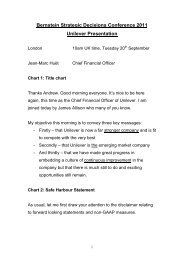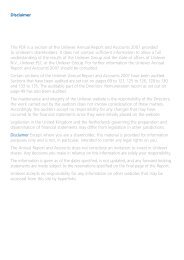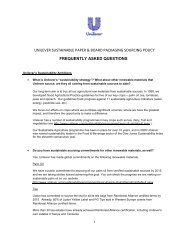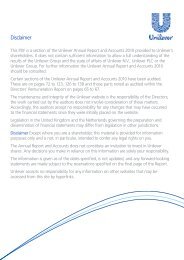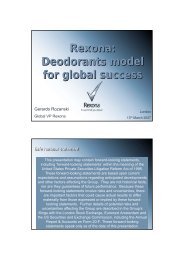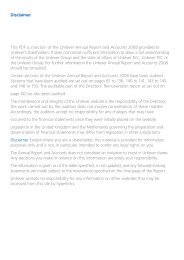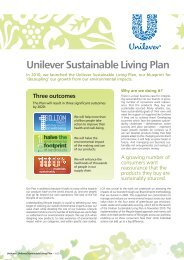Company Accounts - Unilever
Company Accounts - Unilever
Company Accounts - Unilever
Create successful ePaper yourself
Turn your PDF publications into a flip-book with our unique Google optimized e-Paper software.
Financial statements<br />
Notes to the company accounts <strong>Unilever</strong> PLC<br />
Accounting information and policies<br />
Basis of preparation<br />
The accounts have been prepared in accordance with applicable<br />
United Kingdom accounting standards and the United Kingdom<br />
Companies Act 2006.<br />
The accounts are prepared under the historical cost convention as<br />
modified by the revaluation of financial assets classified as ‘available-forsale<br />
investments’, ‘financial assets at fair value through profit or loss’,<br />
and ‘derivative financial instruments’ in accordance with the accounting<br />
policies set out below which have been consistently applied.<br />
Accounting policies<br />
The principal accounting policies are as follows:<br />
Intangible assets<br />
Intangible assets comprise trademarks purchased after 1 January 1998<br />
and are amortised in the profit and loss account over their expected<br />
useful lives of up to a maximum of 20 years. They are subject to review<br />
for impairment in accordance with United Kingdom Financial<br />
Reporting Standard 11 ‘Impairment of Fixed Assets and Goodwill’<br />
(FRS 11). Any impairment is charged to the profit and loss account<br />
as it arises.<br />
Fixed asset investments<br />
Shares in group companies are stated at cost less any amounts written<br />
off to reflect a permanent impairment. Any impairment is charged to<br />
the profit and loss account as it arises.<br />
Financial instruments<br />
The company’s accounting policies under United Kingdom generally<br />
accepted accounting principles (UK GAAP) namely FRS 25 ‘Financial<br />
Instruments: Presentation’, FRS 26 ‘Financial Instruments:<br />
Measurement’ and FRS 29 ‘Financial Instruments: Disclosures’ are the<br />
same as the <strong>Unilever</strong> Group’s accounting policies under International<br />
Financial Reporting Standards (IFRS) namely IAS 32 ‘Financial<br />
Instruments: Presentation’, IAS 39 ‘Financial Instruments: Recognition<br />
and Measurement’ and IFRS 7 ‘Financial Instruments: Disclosures’. The<br />
policies are set out under the heading ‘Financial instruments’ in note 1<br />
to the consolidated accounts on pages 84 and 85. PLC is taking the<br />
exemption for not providing all the financial instruments disclosures,<br />
because IFRS 7 disclosures are given in note 15 to the consolidated<br />
accounts on pages 104 to 110.<br />
140 <strong>Unilever</strong> Annual Report and <strong>Accounts</strong> 2009<br />
Deferred taxation<br />
Full provision is made for deferred taxation on all significant timing<br />
differences arising from the recognition of items for taxation purposes<br />
in different periods from those in which they are included in the<br />
company’s accounts. Full provision is made at the rates of tax<br />
prevailing at the year end unless future rates have been enacted<br />
or substantively enacted. Deferred tax assets and liabilities have not<br />
been discounted.<br />
Shares held by employee share trusts<br />
Shares held to satisfy options are accounted for in accordance with UK<br />
GAAP, namely FRS 25 ‘Financial Instruments: Presentation’, FRS 20<br />
‘Share Based Payments’ and Urgent Issues Task Force abstract 38<br />
‘Accounting for ESOP Trusts’ (UITF 38). All differences between the<br />
purchase price of the shares held to satisfy options granted and the<br />
proceeds received for the shares, whether on exercise or lapse, are<br />
charged to other reserves.<br />
Dividends<br />
Under Financial Reporting Standard 21 ‘Events after the Balance Sheet<br />
Date’ (FRS 21), proposed dividends do not meet the definition of a<br />
liability until such time as they have been approved by shareholders<br />
at the Annual General Meeting. Therefore, we do not recognise a<br />
liability in any period for dividends that have been proposed but will<br />
not be approved until after the balance sheet date. This holds for<br />
external dividends as well as intra-group dividends paid to the parent<br />
company.









